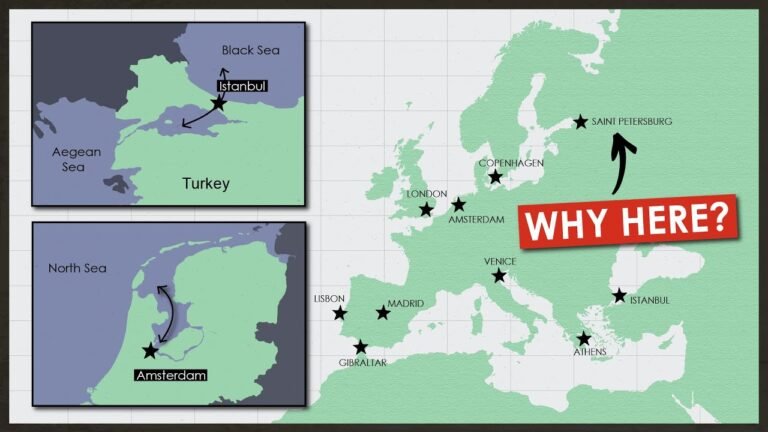
➡️ They are now running an early Black Friday Sale. Go to and get an additional 10% off on any purchase with code GENERALKNOWLEDGE. Thanks to Established Titles for sponsoring this video!
▶ In this video I talk about the strategic locations in which some Europeans cities are located, and how those location choices have benefited them throughout history.
▶ Follow me on Twitter:
▶ TIMESTAMPS:
00:00 Intro
01:56 Istanbul, Turkey
03:20 Amsterdam, Netherlands
04:25 London, England
05:35 Established Titles
06:52 Gibraltar, United Kingdom
08:26 Sevilla, Spain
09:10 Saint Petersburg, Russia
10:13 Lisbon, Portugal
11:21 Paris, France
12:18 Summary
▶ Become a member on Patreon & get exclusive content!
▶ Join the Discord Server:
▶ Business Contact: gilfamc@gmail.com
▶ Thanks for watching, remember to subscribe to catch future videos!
source
Which other cities in Europe (or the world) do you think are well located?
ok, but what about the worst located cities?
It would've been great if there were actual/proper arguments for why they are/were so strategic aswell as a definition to what you mean by "strategic". Bay/river/strait = trade gud covers at least 40% of arguments sadly
Not to sound like a smart ass but there is a lot more to paris’s location.
About 100 km to the south the loire is a highway to the atlantic ocean downstream, while upstream gets you within 50 km of the rhone, from which you go either go straight to the Mediterranean sea or up to switzerland and connect to the rhine and the danube.
Paris was a the center or the frankish kingdown.
It become north of france but with the south protected by the ocean, the sea, the Pyrénées and the alps, there was no need for protection. To the north and the east was where invasions would come from.
Since many of these cities have history’s going back centuries if not millennium then it would make sense that any large sieving city dose so because it’s in such an optimal location. Anything in a poor location is probably an archeological sight by now.
Surprised people still mispronounce the River Thames
But turkey is not european…..false information there but video was good
Who cares? Have u ever wondered how climate change came about??? Huh?
How about Belgrade in Serbia!?
Regarding Amsterdam, I do not agree. It has been a terrible portcity from the beginning.
Yes it grew very fast during the Dutch golden age, but main reasons for that were the blockage of Antwerp and the bullying of the Jews and Huguenots in the rest of Europe.
The Dutch republic was very liberal (compared to the others)
But port wise it was a disaster. Seaships could not reach the city on their own, they had to be lifted in a floating dock and pulled more than 100km over the lake to the harbor.
We didn't place our cities well, but places where cities would be well placed attracted people. It's the thing that happens if you have hundreds and hundreds of years to figure out where to put stuff.
In the case of many of those cities something you didn't mention is the area where they are located. Paris is a central location in France, but why in the northern part rather than in the middle of the southern part? The north of France is a large plain which has always produced the tons of food needed to sustain a large population!
There was a fascinating experiment with slime molds…being that mold, like any other creature – expends energy when it goes out hunting for food – there is a great incentive for the mold to conserve energy, by being as efficient as it possibly can be.
The scientists placed food sources on a map that represented major city subway stations…and the slime mold re-designed the London road & subway system in a more efficient manner than human engineers.
https://www.youtube.com/watch?v=R3o6DofDQO0
The location of St. petersburg is actually preety terrible. It might have been good during the Russian Empire, when both Finland and the Baltic States were a part of the empire, and later the USSR, however nowadays they are not only independent, but also hostile towards Russia. Petersburg is a stone throw away from Estonia's border, and the lagoon its located within can be easily blocked, by enemy ships. Moreover it was built in non ethnic russian territory, with finno – ugric minorities still being present in this region. To top it off – the famous Winter War between Finland and the USSR was fought to give Petersburg more buffer territory. Suffice it to say – Petersburg might be a usefull port city, but its strategic situation is terrible.
Is it really any wonder that cities that have endured for hundreds or in some cases thousands of years were in good locations? I'm willing to bet plenty of European cities weren't and are now gone as a result.
bro said thaimes
S:t Petersburg was founded by Swedes and called Nyenskans (vikings in Neva river mouth year 1000, fortress since 1300 and founded city since 1611). Russian took over the city and changed the name.
They were not "well situated." It's just evolution at work: the poorly situated ones just die out as a city when people move to a better situated one. There were thousands of settlements and the ones that were better situated survived and thrived while the poorly situated ones withered.
Madrid isn't. If it weren't the capital,it would only be a tiny place. It should
6.9k likes, nice